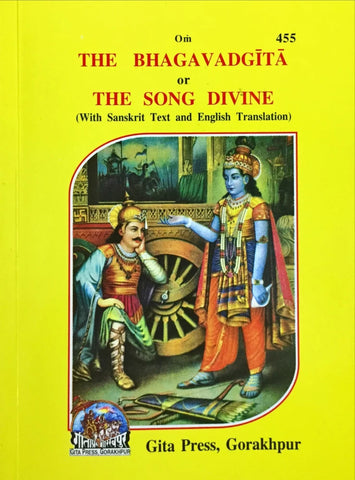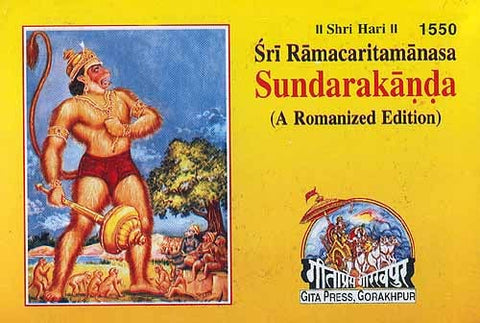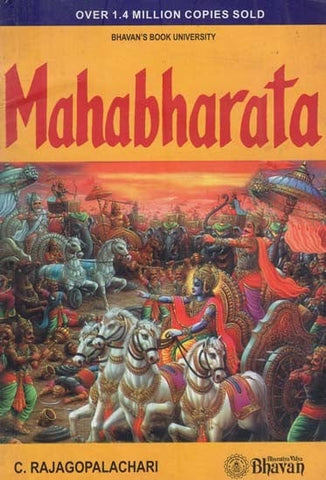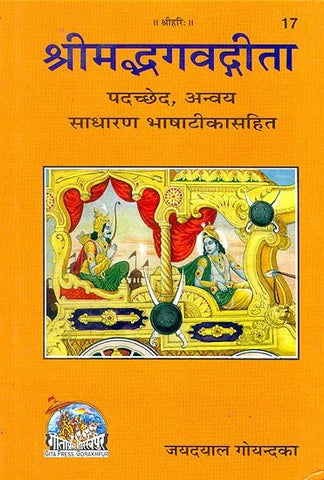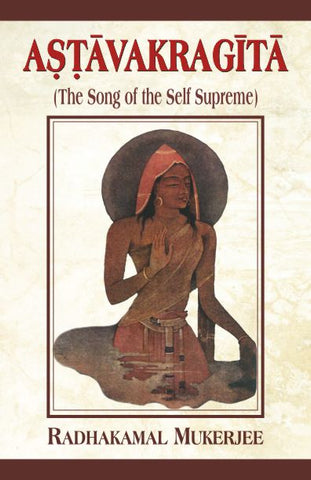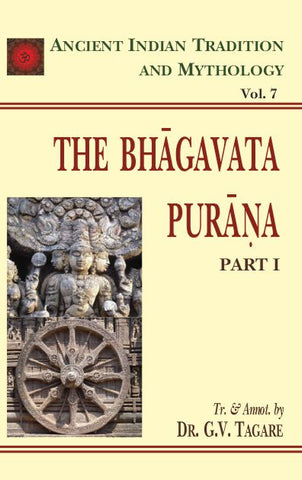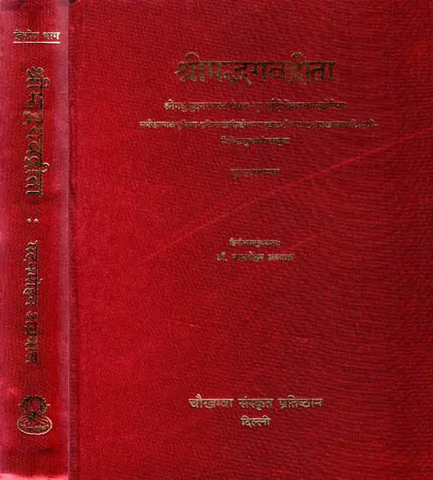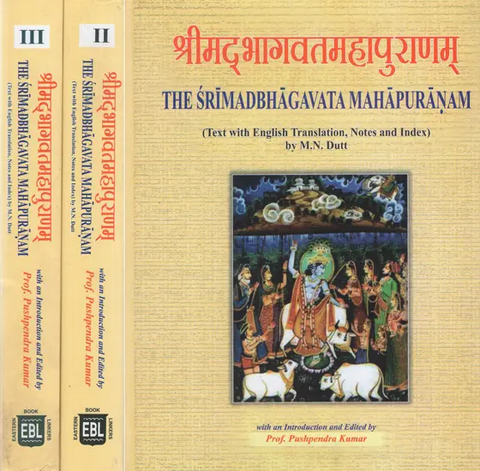Your cart is empty now.
Srimad Bhagavata which comes under the category of scriptural Texts called the Puranas, consists of eighteen thousand and odd verses and is a veritable encyclopedia of spiritual philosophy put in an epic form that is both devotional and poetic. It depicts pure devotion, expressed as unmotivated service of the Divine and of all living beings considered as the tabernacle of God.
Pious Hindus consider daily reading of the Text an important spiritual discipline in life for generating devotion and the spirit of dedication to God. Any person, whatever his religion, will find himself spiritually enriched by a close study of this Text.
This English translation of Srimad Bhagavata Purana seeks to place before the ordinary reader a fairly lucid rendering of the great Text, verse by verse, without any pretension to very high standards of Sanskrit scholarship. Readability has been given precedence over meticulous accuracy throughout the translation. The Bhagavata is a difficult text, in many places too terse to yield a clear meaning, and in others, so vague that one can draw any meaning that one wants to find. It is also not very respectful to grammatical orthodoxy. It will therefore be easy to find many flaws and inaccuracies in the translation, but if it succeeds in engaging the reader's attention and in conveying the devotional spirit of the Text, it would have succeeded in its object.
The Bhagavata, according to orthodox calculations, is supposed to contain eighteen thousand verses, but on actual counting, one will find only about fourteen thousand and odd passages, including prose sections and verses. This difference is caused because the numerous long prose passages of the Text are counted as forming a verse for every thirty-eight letters in the orthodox way of calculation. The colophons are also counted. The whole Text is divided into four volumes- the first comprising Skandhas one to four; the second, five to nine; the third, ten; and the fourth, eleven and twelve. The translation is done verse by verse, and the corresponding number of the original verses is given to their English Prose translation. The Sanskrit original is given in the upper half of the page and the corresponding translation in the lower half. Diacritical marks are not used for Sanskrit expressions, except to distinguish the long 'a' in some unusual names. Quotations are also largely eliminated because there are too many interlocutors.
The translation is mainly on the lines of Sridhara's interpretation, which in itself is too terse. The translator has been immensely helped by the word-for-word split translations of the Text into Malayalam by two renowned Bhagavata scholars of Kerala-Pandit P. Gopalan Nair and Brahmasri Vaisravanam Raman Nampudiri. Their works have made it easy for one to penetrate into the difficult Text and secure a considerable measure of accuracy for the translation. Sri N. Raghunathan's excellent English translation has also been very helpful to determine the meaning of obscure passages.
In regard to the metaphysical affiliation of the Bhagavata, it seems that it is not committed to any particular system exclusively. We find in it representation of all strands of metaphysics common in Indian philosophy. The author of the Bhagavata has no objection to any of them, provided the place of Bhakti as the highest value, the fifth Purushartha attainable by man, is not jeopardised, and the God of Love is not endangered by metaphysical subtleties. The translation has kept this in view, and it is in the light of this ideas that the first verse of the Bhagavata, which is the keynote verse of the whole Text, is translated.
The Introduction seeks to provide considerable background-information required by a modern reader to grasp the methodology and the outlook of Pauranika literature in respect of space, time, Nature and man. There are many more allied themes, like the doctrines of divine love, the theology of the Bhagavata, the doctrines of Incarnations etc., that have to be kept in mind while reading the Text. As their treatment also in the Introduction would make that section too long, some of them are treated in the Prologues to each Skandha, especially in the Prologue to the tenth, and in the Appendix. A close study of them will help in a deeper understand of the Text.
| Preface | vii | |
| Introduction | xix | |
| Prologue | 1 | |
| Chapter 1 | Sages at Naimisharanya | 3-5 |
| Invocation-Rishis approaching Suta for Instruction-The five Questions of the Rishis | ||
| Chapter 2 | The Message of Bhakti | 6-9 |
| Suta's Invocation-Suta's Answer: The Supreme Duty of Man-The Progress of Devotion-Why Vasudeva should be the Object of Worship | ||
| Chapter 3 | Avataras | 10-14 |
| The Purushavatara-The twenty-three Lilavataras-There is no Limit to the Number of Avataras-The Mystery of the One and the Many-The Origin of the Bhagavata | ||
| Chapter 4 | On Veda-Vyasa and his Work | 14-17 |
| Why Parikshit desired to die and Suka instructed him Veda - Vyasa's Re-editing of the Vedas and Composing of the Purana-vyana's Self-questioning about his own Unrest | ||
| Chapter 5 | The Story of Narada | 17-23 |
| Narada diagnosing the Cause of Vyasa's Unrest-Supremacy of Bhakti-Antecedents of Narada-The Glory of Karma Blended with Bhakti | ||
| Chapter 6 | The Story of Narada (Continued) | 23-27 |
| The After-story of Narada-The Divine Vision of Narada and after-Transformation of Narada | ||
| Chapter 7 | The Aftermath of the War | 27-32 |
| Vyasa, Suka, and Bhagavan Vyasa-How and why Suka learnt the Bhagavata-The Revenge of Asvatthama-The Fate of Asvatthama | ||
| Chapter 8 | Krishna's Preparation to Depart | 33-38 |
| The Dastardly Act of Asvatthama-The Hymn of Kunti-The Depression of Yudhishthira | ||
| Chapter 9 | The Salvation Of Bhishma | 38-44 |
| Departure to meet Bhishma-Bhishma on the Glory of Krishna-Bhishma's Hymn to Krishna | ||
| Chapter 10 | Krishna After the Mahabharata War | 44-48 |
| Krishna's Arrival at Dwaraka-The Hymn of the City Women | ||
| Chapter 11 | Krishna After the Mahabharata War (Continued) | 48-52 |
| Sri Krishna's Arrival and Reception at Dwaraka-Krishna amidst his own Relatives | ||
| Chapter 12 | The Birth of Parikshit | 52-55 |
| Protection of Parikshit in his Mother's Womb-Predictions about Parikshit | ||
| Chapter 13 | Demise of Dhritarashtra | 55-61 |
| Vidura's Arrival at Hastinapura-Dhritarashtra's Departure-Narada's Instruction to Yudhishthira | ||
| Chapter 14 | Forebodings about Krishna's Exit | 61-65 |
| Evil Omens seen-Arjuna's Return in utter Distress | ||
| Chapter 15 | Sri Krishna's Ascent and After | 65-71 |
| Arjuna's Return and Report-The Great Abandonment of the Pandavas | ||
| Chapter 16 | Parikshit and the Advent o Kali | 71-75 |
| The Digvijaya of Parikshit-Conversation between Dharma and Mother Cow | ||
| Chapter 17 | Parikshit's Subdual of Kali | 75-80 |
| Parikshit meets Dharma and Earth in a pitiable Plight-Parikshit marks out five Places for Kali | ||
| Chapter 18 | Parikshit is Cursed | 80-85 |
| Last Days of Parikshit-The Rishis and Suta on the Greatness of the Lord-Indiscretion of Parikshit | ||
| Chapter 19 | Parikshit's Resolve and Suta's Arrival | 85-90 |
| Parikshit's Repentance and Resolve-Conversation with the Rishis about his (Parikshit's) Resolve-Arrival of Sri Suka | ||
| Prologue | 91-92 | |
| Chapter 1 | Suka's First Sermon | 93-97 |
| What one should do at the Approach of Death-Meditation on the Cosmic Form | ||
| Chapter 2 | Dissertation on Eschatology | 97-103 |
| Gospel of Renunciation-Meditation on the Form-How a Yogi passes away a Yogi transcends different Spheres up to Brahmaloka-How the Yogi passes passes beyond Brahmanda | ||
| Chapter 3 | Devotion-Motivated and Unmotivated | 103-105 |
| The Supreme Being alone is worshipped through all Deities-A Life Lived without Bhakti is useless | ||
| Chapter 4 | Suka's Hymn to the Divine | 105-108 |
| Parikshit's Question on the Divine Mystery-Suka's Hymn to the Lord | ||
| Chapter 5 | The Universe as a Form of the Lord | 108-112 |
| Narada's wrong Estimate of Brahma-Narada corrected: Glory of Narayana-Creation of the Universe-The fourteen Worlds as the Lord's Universal Form | ||
| Chapter 6 | The Divine and His Manifestation | 113-117 |
| Further Details about the Universal Form-The Divine Transcendence-The Yajna Purusha-The Supreme Being: His transcendent Nature-His Manifestations | ||
| Chapter 7 | Bhagavata in Brief | 117-125 |
| A Summary of Incarnations-Krishna Incarnation-Other Divine Manifestations-Inexhaustible Nature of the Lord's Glories | ||
| Chapter 8 | The Greatness of Bhakti - Parikshit's Questions for Elucidation | 125-128 |
| The Greatness of Bhakti - Parikshit's Questions for Elucidation | ||
| Chapter 9 | The Inspiration of Brahma | 128-134 |
| Brahma commanded to do Tapas-The Vision of Brahma Brahma's Request to the Lord-Instruction on Supreme Knowledge-Origin of the Bhagavata from Brahma | ||
| Chapter 10 | The Cosmic Form of the Lord | 134-139 |
| The ten Characteristics of the Bhagavata-Narayana or Garbhodakasayi-The Adhidaivika, the Adhyatmika and Adhibhautika Aspects-Other Aspects of the Gross From-Manifestations from other Points of View-Conclusion of the Canto | ||
| Prologue | 140-143 | |
| Chapter 1 | Vidura and Uddhava: Their Meeting | 144-149 |
| Vidura's Exit-Conversation between Vidura and Uddhava | ||
| Chapter 2 | Uddhava's Narration o Krishna's Life | 150-153 |
| Uddhava reminisces about Krishna-Early Life of Krishna | ||
| Chapter 3 | Uddhava's Narration of Krishna's Life (Continued) | 153-156 |
| The latter part of Krishna's Life | ||
| Chapter 4 | Uddhava on the Last Day of Krishna | 157-160 |
| Destruction of the Yadus-Uddhava's Submission and Krishna's Reply-Parting of Uddhava and Vidura | ||
| Chapter 5 | First Stage of Creation | 161-167 |
| The Questions of Vidura-Creation of Categories-The Hymn of the Deities | ||
| Chapter 6 | The Virat Purusha, The Cosmic Being | 167-170 |
| The Origin of the Virat-Diversification of the Limbs of the Virat-The Limbs of the Virat as the Universe-Unlimitedness of the Lord's Glory | ||
| Chapter 7 | Visarga or Secondary Creation | 171-175 |
| Functioning of Divine Maya-Visarga or Secondary Creation | ||
| Chapter 8 | The Dawn of Creation | 175-179 |
| Another Version about the Origin of the Bhagavata-The Universe in Chaos-The Quest of Brahma Brahma's Vision of the Lord | ||
| Chapter 9 | Brahma Commissioned to Create | 179-185 |
| Brahma's Hymn-Mahavishnu blessing Brahma | ||
| Chapter 10 | Visarga or the Creation of Brahma (Continued) | 185-188 |
| Brahma at the Commencement of Creation-What is Time The Ninefold Form of Visarga-Vaikrita Creation; the Creation of Brahma | ||
| Chapter 11 | Time in all its Dimensions | 188-192 |
| The Division of Time-The four Yugas-The Age of Brahma and others-Pralaya or Dissolution-The Parardha | ||
| Chapter 12 | Brahma's Creation | 193-197 |
| Brahma's Dissatisfaction with the Creation of Evil-Creation of Sanaka and others-Creation of Rudra-Creation of Marichi and the nine other Rishis-Brahma's incestuous Urge-Creation of the Vedas and the various means of Life-Creation of the Sexes | ||
| Chapter 13 | Incarnation as the Causal Boar | 198-203 |
| Swayambhuva Manu and Satarupa-Incarnation as Cosmic Boar-Hymn of the Rishis-The Glory of the Boar Incarnation | ||
| Chapter 14 | Hiranyaksha and Hiranyakasipu: Their Origin | 204-208 |
| Introduction-Diti approaching Kasyapa for Progeny-diti's Persistence and her later Repentance-Prajapati on the Nature of his Progeny | ||
| Chapter 15 | Hiranyaksha and Hiranyakasipu: The Curse of the Kumaras | 209-215 |
| Representation of the Devas to Brahma-The Kumaras at Vaikuntha-The Obstruction of the Kumaras by the Gatekeepers-The Curse by the Kumaras-Description of Mahavishnu's From-The Hymn of the Kumaras | ||
| Chapter 16 | Hiranyaksha and Hiranyakasipu: Final Settlement of their Fate | 216-223 |
| Relationship with Holy Men-The Kumaras apologising to the Lord-Final Settlement of the Fate of the Attendants | ||
| Chapter 17 | Hiranyaksha and Hiranyakasipu: Their Birth | 220-223 |
| Evil Portents at the Birth of the Asuras-The Adventures of the Asuras-Challenge to Varuna | ||
| Chapter 18 | Hiranyaksha and Hiranyakasipu: The Fight of the Former with Vishnu | 223-227 |
| The Asura's Challenge to the Incarnate Boar-The Lord's mocking Response-The Fight between the Asura and the Lord | ||
| Chapter 19 | Hiranyaksha and Hiranyakasipu: Destruction of the Former | 227-230 |
| The further Development of the Fight-Fight with the magical Devices-Death of Hiranyaksha-In Praise of the Episode | ||
| Chapter 20 | Creation as Expression of Brahma's Moods | 231-235 |
| Questions on the further Propagation of Creatures-A Review of the earlier Stages of Creation-The creative Moods of Brahma-Asuras-Gandharvas, Pitris and the Kinnaras-Creation of Manu or Man | ||
| Chapter 21 | Kardama Prajapati's Creative Role | 236-241 |
| Kardama's Tapas-Kardama's Vision of the Lord and his Prayer-The Lord's Commandment to Kardama-Manu Swayambhuva's Visit to Kardama's Ashrama | ||
| Chapter 22 | Kardama's Marriage with Devahuti | 241-245 |
| The Manu's Offer of Devahuti in Marriage-Kardama's Acceptance-Swayambuva's Return | ||
| Chapter 23 | Devahuti and Kardama in the Aerial Mansion | 245-250 |
| Devahuti's Service of Kardama-The magical aerial Mansion-Life of Devahuti and Kardama in the aerial Mansion-Devahuti's Prayer to Kardama to stay on | ||
| Chapter 24 | Birth of Kapila and Kardama's Departure | 250-254 |
| Kapila's Birth-Kardama's Hymn to Kapila-Kardama's Departure | ||
| Chapter 26 | Kapilopadesa: The Categories | 260-267 |
| Purusha and Prakriti-Evolutes of Prakriti and Time-Mahattattwa or Hiranyagarbha-Ahankara-Evolutes of Ahankara-Tanmatras, Indriyas and Bhutas-Virat Purusha-Rousing of the Virat Purusha | ||
| Chapter 27 | Kapilopadesa: The Way of Release | 268-271 |
| The Purusha's Bondage and Liberation-The Finality of Release | ||
| Chapter 28 | Kapilopadesa: Discipline for Realisation | 271-277 |
| Ways of Self Purification-Meditation on the Divine From-Realisation of the Divine | ||
| Chapter 29 | Kapilopadesa: Some Details of the path of Devotion | 277-281 |
| Bheda Bhakti contrasted with Nirguna Bhakti-Some devotional Disciplines-Image Worship vs. Seeing God in al-A Spiritual View of Evolution-Time, what it is | ||
| Chapter 30 | Kapilopadesa: The Destiny of the Sinful | 281-284 |
| Life and Death of the Wordling-The Sufferings of Purgatory | ||
| Chapter 31 | Kapilopadesa: The Jiva's Cycle of Births and Deaths | 284-290 |
| The Foetus in the Womb-The Foetus in Praise of the Lord-The Failure of Jiva to learn by Experience of Spiritual Degradation-The Meaning of Death | ||
| Chapter 32 | Kapilopadesa: The Spiritual Goal | 290-295 |
| Attainment of perishable Worlds-The Attainment of Brahmaloka-Fruits of the Life of Attachment-The Bhagavan as the one Goal of all Aspirants-Stages of Spiritual Development | ||
| Chapter 33 | Kapilopadesa: Conclusion | 295-299 |
| Devahuti's Hymn to Kapila-The After-life of Devahuti | ||
| Prologue | 300-302 | |
| Chapter 1 | The Lines of Swayambhuva's other Daughters | 303-308 |
| Yajna and Dakshina-The Line of Kardama Prajapati Atri's Issue-The Line of Angiras-Daksha Prajapati's Line-Nara-Narayana Incarnation-Some other Lines of Rishis | ||
| Chapter 2 | Confrontation between Rudra and Daksha | 309-312 |
| The Satra of the Prajapatis-Bhrigu's Curse | ||
| Chapter 3 | Sati Devi's Desire to Visit Daksha's Sacrifice | 312-315 |
| Sati Devi's Address to Sri Rudra-Rudra advising her not to attend the Yajna | ||
| Chapter 4 | The Death of Sati Devi | 315-320 |
| Insult of Sati at Daksha's Sacrifice-Sati Devi's Criticism of Daksha's Conduct-Sati declares her Decision to die-Sati consumes her Body in Yogic Fire | ||
| Chapter 5 | The Destruction of Daksha | 320-323 |
| The Emergence of Virabhadra-The Evil Portents at the Site of the Yajna-The Destruction of the Yajna | ||
| Chapter 6 | Propitiation of Sri Rudra | 323-328 |
| Deva's resorting to Brahma-Description of Kailasa-Description of Alakapuri and Saugandhika Forest-Rudra under the Banyan Tree-Hymn to Rudra | ||
| Chapter 7 | The Completion of Daksha's Sacrifice | 329-337 |
| Rudra placated by the Efforts of the Devas-Daksha's Repentance; Sri Hari's Appearance-Hymns in Praise of Sri Hari-The Conclusion of the Yajna | ||
| Chapter 8 | The Story of Dhruva | 237-345 |
| The Progeny of Adharma-Dhruva's Discomfiture at the Hands of Surichi-Suniti's Advice to Dhruva-Narada's first Advice to Dhruva, dissuading him-Narada sympathizes with Dhruva and advises him on Meditation-Uttanapada's Repentance-Dhruva's Tapas | ||
| Chapter 9 | Dhruva's Return and Installation | 345-352 |
| Dhruva's divine Vision-Dhruva's Hymn to Mahavishnu-Granting of Boons to Dhruva-Dhruva's Repentance over the Boons-Dhruva's Reception by his parents and People-Dhruva at the Palace and his Installation | ||
| Chapter 10 | Dhruva's War with the Guhyakas | 353-355 |
| His initial Success in Battle-The magical Battle | ||
| Chapter 11 | Swayambhuva's Counsel to Dhruva | 355-359 |
| Dhruva releases Narayanastra-Swayambhuva's Advice to Dhruva | ||
| Chapter 12 | Reconciliation with Kubera and After | 359-364 |
| Kubera meets Dhruva Dhruva's Rule and Abandonment Arrival of Mahavishnu's Emissaries to take Dhruva-Ascension of Dhruva-Glory of Dhruva | ||
| Chapter 13 | From Dhruva to Vena | 364-369 |
| The Descendants of Dhruva-Circumstances leading to Vena's Birth-Anga's Flight | ||
| Chapter 14 | Vena's Misrule and Death | 369-373 |
| The Vagaries of Vena-The Rishis in Consultation The Conciliatory Words of the Rishis-Vena's Insolent Reply and Death-The Churning of Vena's Body | ||
| Chapter 15 | Prithu's Advent and Coronation | 373-375 |
| The Birth of Prithu-Various Devas offer Presents to Prithu-Prithu's Modesty | ||
| Chapter 16 | Panegyric of Prithu | 376-378 |
| Many-sided Greatness of Prithu | ||
| Chapter 17 | Punishment of the Earth-goddess | 379-382 |
| The Call of the Hungry to Prithu-The Earth-goddess is threatened to Prithu by the Earth-goddess | ||
| Chapter 18 | The Milking of the Earth-goddess as a Cow | 383-385 |
| The Self-justification of the Earth-goddess-The Milking of Various Resources | ||
| Chapter 19 | The Story of Prithu's Horse Sacrifice | 385-389 |
| The Scene of Prithu's Horse Sacrifice-Indra's Attempt to obstruct the Sacrifice-Brahma affects a Reconciliation between Prithu and Indra | ||
| Chapter 20 | The Lord Blesses Prithu | 389-394 |
| The Reconciliation of Prithu and Indra by the Lord-Prithu's Hymn to the Lord-The Lord's Departure | ||
| Chapter 21 | Prithu's Exhortation to His Subjects | 394-399 |
| Prithu's Entry into his City-Performance of a Satra by Prithu-Prithu's Address to his People Greatness of Prithu. | ||
| Chapter 22 | The Sermon of the Kumaras | 400-406 |
| The Arrival of the Kumaras-Their Reception by Prithu-Sanatkumara's Sermon-Prithu's Worship of the Kumaras-Greatness of Prithu | ||
| Chapter 23 | The Salvation of Prithu | 407-411 |
| Prithu's Asceticism as a Vanaprastha-How Prithu left the Body-The Greatness of the wife of Prithu-The Greatness of Prithu's Story | ||
| Chapter 24 | Instruction of Prachetas in Rudra Gita | 411-418 |
| Antardhana to Prachinabarhis-The Prachetas' Meeting with Sri Rudra-Unity of Siva and Vishnu-Rudra Gita | ||
| Chapter 258 | The Allegory of Puranjana | 419-424 |
| Narada meeting Prachinabarhis-Narada's Tirade against Ritualism-The City of Puranjana-Puranjana falling in Love with a Lady-The Lady's Reply to Puranjana's Advances-The Nine Gates of Puranjana's City-Puranjana in Bondage | ||
| Chapter 26 | Puranjana's Hunting Expedition | 424-427 |
| The Metaphor of Puranjana's Chariot-Puranjana's Reckless Hunt-Puranjana's angry Wife-Purnajana pacifying his Wife | ||
| Chapter 27 | The Story of the Daughter of Time | 427-430 |
| Puranjana in the Company of his Wife-The Attack of Old Age-Grey-haired Old Age, the Daughter of Time | ||
| Chapter 28 | Puranjana's Next Birth and Liberation | 430-436 |
| Attack by Bhaya on Puranjana's City-Puranjana's last Reflection-Puranjana's Death and After-Puranjana's Rebirth as a Woman-Malayadhwaja's Retirement to the Forest and his Demise-Interpretations of the Allegory | ||
| Chapter 29 | The Meaning of the Allegory | 436-445 |
| Puranjana as the Jiva in the nine-gated city of the Body-The Dream as the Hunt-The Enemies of Puranjana-The woes of the Jiva in Samsara-Devotion as the Panacea for Suffering-The Limitation of Vedic Ritualism-The Allegory of the Deer-Linga Sarira as the Link between Rebirths A Clue from Dram to the Nature of Linga Sarira and Rebirth-Devotion as a Panacea for Samsara | ||
| Chapter 30 | The Story of the Prachetas (Continued) | 446-451 |
| The Tapas and the Vision of the Prachetas-The Hymn of the Prachetas-Daksha reborn | ||
| Chapter 31 | The End of the Prachetas | 451-455 |
| Narada at the Brahmaputra of the Prachetas-Narada's Discourse on Bhakti-Vidura parts from Maitreya |
Delivery and Shipping Policy
- INTERNATIONAL SHIPPING
- Rs.1000-1100/kg
- ESTD. Delivery Time: 2-3 weeks (depending on location)
- Bubble Wrapped with Extra Padding
- NATIONAL SHIPPING
- NCR: Rs. 30/half kg
- Standard: Rs. 80/half kg
- Express shipments also available on Request
- ESTD. Delivery Time: Ranging from 1-4 days up to 7 business days (Depending on your choice of Delivery)
- TRACKING
- All orders; national or international, will be provided with a Tracking ID to check the status of their respective orders
- Depending on the Shipping Service, Tracking ID may be used on their respective tracking portals
Frequently Asked Questions (FAQs)
Domestic Shipping: 3-4 Days (after shipping)
International Shipping: 1-2 weeks (based on your location)
You will receive an email once your order has been shipped or you can email us if you didn't receive tracking details (info@mlbd.co.in)
Every book that we sell is the latest edition except all the rare books
Yes, we do provide free shipping, only on domestic orders (within India) above Rs.1500












